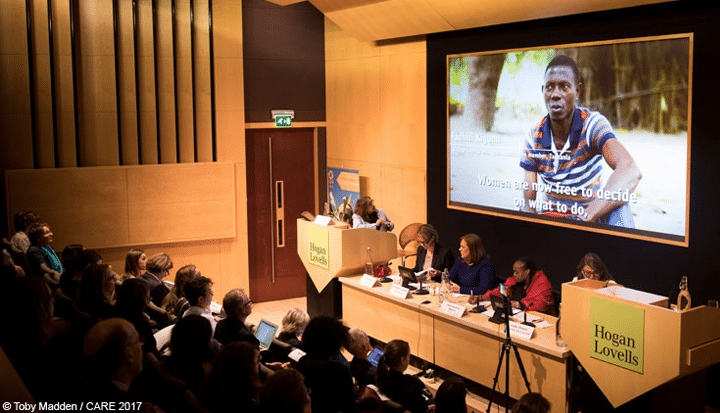CARE was delighted to host yesterday’s event to a full house of business leaders, global experts, and civil society actors to talk about how the private sector can empower women in the economy, including by implementing the UN High Level Panel (HLP) on Women’s Economic Empowerment’s new recommendations.
Thank you to all the panellists and everyone who attended the event or followed online (#WomensBusiness was trending on Twitter!). Here are some of the top take-aways from the discussion which I mentioned in my closing remarks last night:
• The role of business across the supply chain – I loved the comment from Cathy Pieters [Mondelez International] about putting on your “women’s empowerment glasses” and looking at your entire business through those glasses.
• Really necessary to think about women’s economic empowerment as a sustainability strategy, not just in terms of CSR.
• Social norms – let’s not just think about the usual suspects when we talk about social norms, but how can we influence the broader community; and for companies, think about your own advertising, and the role modelling we can do. It was good to hear Gwen Hines [DFID] also remind us we need to deal with the challenging stereotypes of men’s caring roles.
• Nana Afadzinu’s [WACSI] idea of Village Savings and Loan Associations being not just a mechanism for financial inclusion but as a broader space for bringing women together, a space for women’s voice, a platform for addressing deeper issues such as violence against women and preventing early marriage.
• The big practical thing that I loved: the UN HLP toolkits. If your inboxes are anything like mine, there are loads of documents that you flag and think “I’ll come back and read those one day” – but let’s all pledge not to make the toolkits one of those documents. Because – as Purna Sen [UN Women] and Cindy Drakeman [DoubleXEconomy] pointed out – they are a really useful set of pragmatic, implementable, useable guides we can all use in our work to create a gear change for women’s economic participation and empowerment.
The Empowering women in the economy event has been all about action. Here are two ideas for everyone who wants a really specific, concrete action to take away:
1. CARE has joined the global campaign to establish a new ILO convention on preventing gender-based violence in the workplace. Shockingly, 50% of all women experience sexual harassment at work. We hope everyone will join in this campaign, from businesses to governments to trade unions. The consultation deadline is 22 September, so please lend your voice in support to that campaign.
2. One of our partners in the Empowering women in the economy event, Business Fights Poverty, is in the process of launching its latest challenge – which is going to be all about how to translate those vast amounts of data that exist on the barriers to women’s economic empowerment, into some concrete, actionable implementation guides for private sector impact. CARE and Diageo have already signed up to that, and we’d love for others to get involved too.
Thank you to everyone who took part in this stimulating, action-oriented discussion – please continue to join the conversation, and keep up the momentum on women’s economic empowerment, on #WomensBusiness and here on Insights.
And if you need a bit of Friday inspiration – take a look at the film:
This article first appeared on CARE International and is reproduced with permission.










